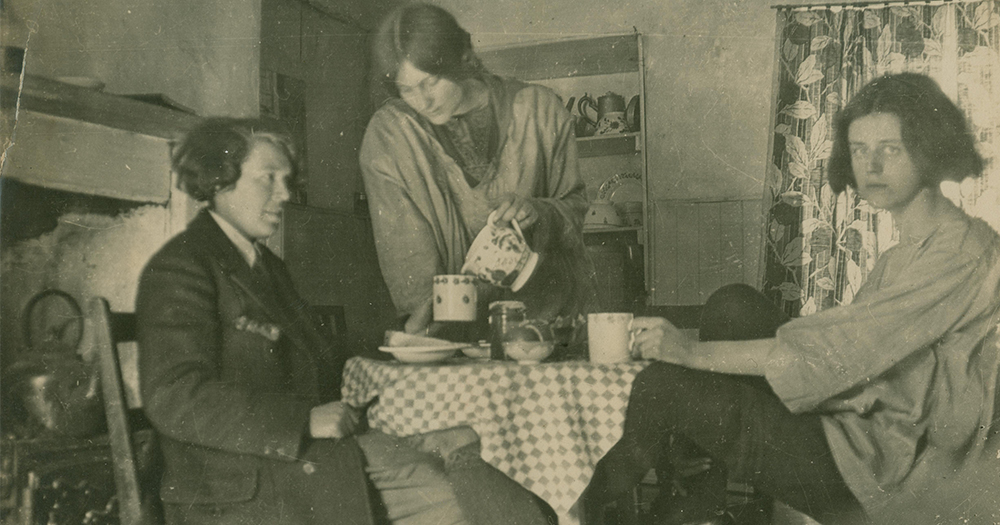Today we celebrate 100 years of women’s vote in the UK and Ireland. When picturing the women who fought for their rights in 1918, most will think of the archetypal suffragette: straight, white and able-bodied.
This stereotypical persona was depicted in the 2015 film Suffragette. Many accused the film’s creators of “whitewashing” the feminist movement that got women the right to vote.

The typical understanding of who the suffragettes were fails to include many key figures of the political revolution, for example, the true prominence of queer women in the movement.
Historian Diane Atkinson, author of Rise Up Women! The Remarkable Lives of the Suffragettes told Broadly about the “long and enduring romantic relationship” between suffragettes Evelina Haverfield and the Pankhursts’ chauffeur, Vera ‘Jack’ Holme. “These two were quite openly a couple and, in fact, they had each other’s initials carved on their bed,” she says.

Atkinson’s book also details the “very open couple” Lettice Floyd and Annie Williams. It is believed that queer women were highly accepted in the women’s movement: ”They were all in same-sex relationships; they were all very actively involved; they were quite prominent; they weren’t hiding in any closet; they were out in doing it,” Atkinson explains. “It was a single-issue campaign, which made it a very diverse, broad church.”
In Ireland, Kathleen Lynn was a prominent figure in the Suffragette movement. The relationship between Lynn and her life partner Madeleine ffrench-Mullen was described as “having all the markings of a marriage”. Kathleen was a member of the executive committee of the Irish Women’s Suffragette and Local Government Association from 1903 until 1916.

She joined the Irish Citizen Army and was chief medical officer during the 1916 Easter Rising. She described herself as “a Red Cross doctor and a belligerent” when she was arrested. She was imprisoned in Kilmainham Gaol with her comrades Countess Markievicz, Molony and Madeleine ffrench-Mullen.
Lynn claimed, many years after the 1916 rising, that it was suffrage that converted her to republicanism, saying: “I saw that people got the wrong impression about suffrage and that led me to examine the Irish question.”
You can watch the documentary Kathleen Lynn – The Rebel Doctor, on the IFI Player here.
Queer Erasure
The lack of documented history of queer activists in the women’s movement has been blamed on “some male historians”. Hilary McCollum, who spoke about the key role of lesbian and bisexual women in the fight for votes for women at the London School of Economics said:
“There has been very great erasure,” she says. “The history of the women’s movement has been largely recorded by male historians. And there are some very prurient attitudes… Lesbian and bisexual relationships have either largely been made invisible or, when they’re discussed, it is quite often in sensationalist terms.”
McCollum also remarked that queer women played an absolutely critical role and held some of the most prominent leadership figure, such as Ethel Smyth, the composer of suffragette anthem The March of the Women.
Relevance In 2018
Women in Ireland are still fighting for equality, autonomy and freedom in 2018. Later this year, Ireland will vote on the referendum to ‘repeal and replace’ the Eighth Amendment.
The LGBT+ community has played a role in advocating for this change. As Ailbhe Smyth said: “It’s really important that just as the feminist movement fought for LGBT rights, that the LGBT movement fight for women’s rights to control our sexuality and our reproduction. It makes absolute sense, and I do believe that LGBT people are very supportive. It’s about that movement, that progressive social change, that journey we’ve all been embarked on for such a long time now.”
In honour of the countless suffragettes who fought for women’s right to vote, you should check that you’re registered to vote here.
© 2018 GCN (Gay Community News). All rights reserved.

comments. Please sign in to comment.